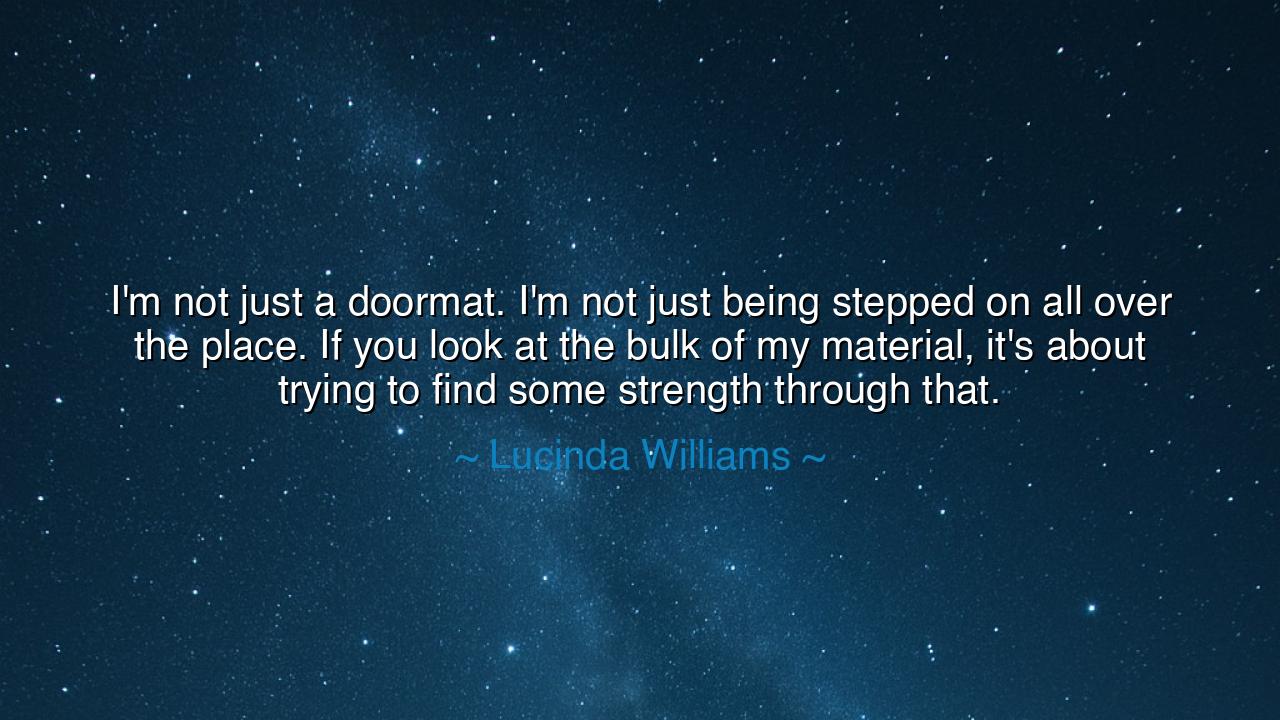
I'm not just a doormat. I'm not just being stepped on all over
I'm not just a doormat. I'm not just being stepped on all over the place. If you look at the bulk of my material, it's about trying to find some strength through that.






Lucinda Williams’s words, “I’m not just a doormat. I’m not just being stepped on all over the place. If you look at the bulk of my material, it’s about trying to find some strength through that,” speak with the raw honesty of one who has wrestled with suffering and yet refuses to be defined by it. Her declaration is both defiance and testimony: though life may bring wounds, betrayal, and hardship, these do not reduce her to helplessness. Instead, she transforms them into art, into voice, into strength.
The origin of this insight lies in Williams’s life and music. As a singer-songwriter, she has always written with unflinching vulnerability about heartbreak, loneliness, and loss. Yet she never allowed these themes to make her appear weak or passive. Rather, her songs serve as a map of survival, showing that one can confront pain without surrendering to despair. By acknowledging that she is “not just a doormat,” she reclaims dignity from experiences that might otherwise have left her voiceless.
History too has known such figures. Consider Harriet Tubman, born into slavery, beaten and oppressed, seemingly condemned to live as a “doormat” beneath the cruelty of her time. Yet she rose from these chains, found strength in her suffering, and became a liberator, guiding countless others to freedom through the Underground Railroad. Like Williams, Tubman refused to be defined by what was done to her; she transformed oppression into courage and weakness into power.
This teaching also recalls the spirit of the poet Maya Angelou, who endured racism, abuse, and silencing in her early life, yet proclaimed with immortal words, “Still I Rise.” She too took the experiences of being stepped upon and turned them into songs of resilience. Her poems and life embodied the very truth Williams reveals: that though the world may try to reduce a soul to dust beneath its feet, that soul can rise stronger, bolder, and more radiant for the trampling.
Lucinda Williams’s quote also reveals the nature of art itself. True art does not emerge from ease, but from the tension of struggle. A song, a poem, a painting born of pain yet infused with resilience carries within it the power to heal not only the creator but also those who hear and behold it. In her case, music becomes the vessel through which despair is transformed into defiance, weakness into strength, and silence into testimony.
For us who hear this wisdom, the lesson is profound: do not allow the hardships of life to strip you of your identity or dignity. Even if you are pressed down, stepped upon, or dismissed, you are not a doormat. Within you lies the ability to transform pain into power, rejection into resilience, and wounds into wisdom. Like Williams, learn to find strength not by avoiding suffering, but by transmuting it into a source of growth and expression.
The practical path forward is this: when faced with hardship, do not bury your story. Speak it, sing it, write it, live it. Channel your pain into something that endures beyond the moment. Do not let those who step upon you define your worth; instead, let their actions awaken your inner resilience. In doing so, you will inspire others to see that even the most broken paths can lead to strength.
Thus, let Lucinda Williams’s words endure as a guide: the world may try to make you a doormat, but you are not bound to remain there. Within every heart lies the capacity to rise, to speak, to sing, and to turn suffering into strength. This is the way of the resilient soul—the way of turning wounds into wisdom, and despair into defiance.






AAdministratorAdministrator
Welcome, honored guests. Please leave a comment, we will respond soon